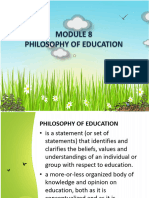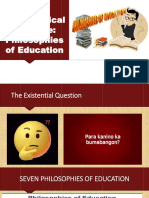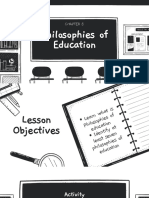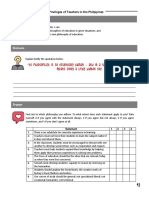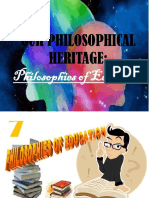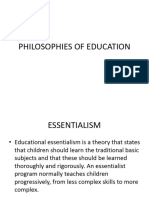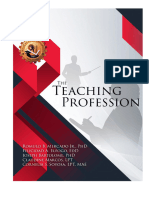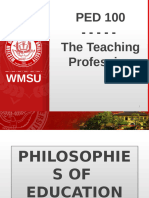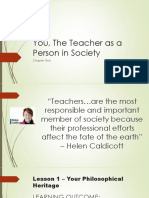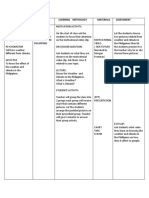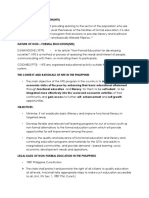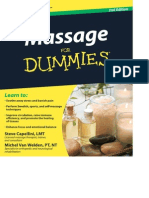0 ratings0% found this document useful (0 votes)
108 viewsPhilosophy of E-Wps Office
Philosophy of E-Wps Office
Uploaded by
Jackie DumaguitThis document outlines different philosophies of education including essentialism, progressivism, perennialism, existentialism, behaviorism, linguistic philosophy, and constructivism. Essentialism focuses on basic skills and content mastery taught by the teacher. Progressivism aims to develop citizens for democracy through need-based and hands-on learning. Perennialism centers on universal human nature and traditions taught through classics. Constructivism views learners as knowledge builders who construct meaning through experiences and hypothesis testing rather than knowledge deposition.
Copyright:
© All Rights Reserved
Available Formats
Download as PPTX, PDF, TXT or read online from Scribd
Philosophy of E-Wps Office
Philosophy of E-Wps Office
Uploaded by
Jackie Dumaguit0 ratings0% found this document useful (0 votes)
108 views15 pagesThis document outlines different philosophies of education including essentialism, progressivism, perennialism, existentialism, behaviorism, linguistic philosophy, and constructivism. Essentialism focuses on basic skills and content mastery taught by the teacher. Progressivism aims to develop citizens for democracy through need-based and hands-on learning. Perennialism centers on universal human nature and traditions taught through classics. Constructivism views learners as knowledge builders who construct meaning through experiences and hypothesis testing rather than knowledge deposition.
Original Description:
jackie dumaguit
Original Title
Philosophy of E-wps Office
Copyright
© © All Rights Reserved
Available Formats
PPTX, PDF, TXT or read online from Scribd
Share this document
Did you find this document useful?
Is this content inappropriate?
This document outlines different philosophies of education including essentialism, progressivism, perennialism, existentialism, behaviorism, linguistic philosophy, and constructivism. Essentialism focuses on basic skills and content mastery taught by the teacher. Progressivism aims to develop citizens for democracy through need-based and hands-on learning. Perennialism centers on universal human nature and traditions taught through classics. Constructivism views learners as knowledge builders who construct meaning through experiences and hypothesis testing rather than knowledge deposition.
Copyright:
© All Rights Reserved
Available Formats
Download as PPTX, PDF, TXT or read online from Scribd
Download as pptx, pdf, or txt
0 ratings0% found this document useful (0 votes)
108 views15 pagesPhilosophy of E-Wps Office
Philosophy of E-Wps Office
Uploaded by
Jackie DumaguitThis document outlines different philosophies of education including essentialism, progressivism, perennialism, existentialism, behaviorism, linguistic philosophy, and constructivism. Essentialism focuses on basic skills and content mastery taught by the teacher. Progressivism aims to develop citizens for democracy through need-based and hands-on learning. Perennialism centers on universal human nature and traditions taught through classics. Constructivism views learners as knowledge builders who construct meaning through experiences and hypothesis testing rather than knowledge deposition.
Copyright:
© All Rights Reserved
Available Formats
Download as PPTX, PDF, TXT or read online from Scribd
Download as pptx, pdf, or txt
You are on page 1of 15
PHILOsOPHY OF EDUCATION
PHILOSOPHY
• The term has been derived from
two Greek words, ‘Philos' means
love and Sophia' means wisdom.
• Philosophy means love for
knowledge or passion.
EDUCATION
• In literary sense, education owes
its origin to the two Latin words:
" Educare."
• Educatum means the “act of
teaching and gaining”.
Philosophy of Education
• Philosophy in education may be defined
as the application of the fundamental
principles of a philosophy of life to the
work of education.
• Philosophy of education offers a definite
set of principles and establishes a definite
set of aims and objectives.
"EDUCATION WITHOUT
PHILOSOPHY IS BLIND AND
PHILOSOPHY
WITHOUT EDUCATION IS INVALID'"
VARIOUS PHILOSOPHIES OF
EDUCATION
1. ESSENTIALISM
• Contends that teachers teach for learners
to acquire basic knowledge,Skills and
Values.
• The emphasis is on academic content for
students to learn the basic skills or the
fundamental r's- reading, riting, 'rithmetic,
right conduct.
• emphasize mastery of teacher.
2. PROGRESSIVISM
• Teach to develop learners into becoming
enlightened and intelligentcitizens of a
democratic society.
• Identified with need-based and relevant
curriculum.
• Employ methods. They believe that one
learns by doing.
3. PERENNIALISM
• Is a universal one on the view that all
human beings possess the same essential
nature.centered around teachers'teachers
do not allow the students interests and
experiences to substantially dictate what
they teach.
• Great books of ancient and medieval as
well as a tradition of culture which must
initiate each generation.
4. EXISTENTIALISM
• Focus on the individual. Learning is self-
paced, self- directed.
• Main concern is "to help students
understand and appreciate themselves
as unique individuals who accept
complete responsibility for their
thoughts,feelings and actions students
are given a wide variety of options from
which to choose.
5. BEHAVIORISM
• Are concerned with the modification and
shaping of student's behavior by providing
for a favorable environment.
• Teach students to respond favorably to
various stimuli in the environment.
• "Ought to arrange environmental
conditions so that the students can
makethe responses to stimuli.
6. LINGUISTIC PHILOSOPHY
• To develop the communication
skills of the learner.
• Should be taught to communicate
clearly most effective way to
teach language and
communication is theexperiential
way.
7. CONSTRUCTIVISM
• To develop intrinsically motivated and
independent learners adequately equipped with
learning skills for them to be able to construct
knowledge and make meaning for them.
• The learners are taught how to learn.
• The teacher provides students with data or
experiences that allow them to hypothesize,
predict, manipulate objects.
"Knowledge isn't a thing that can be
simply deposited by the teacher into the
empty minds of the learners. Rather,
knowledge is constructed by the learners
through an active, mental processes of
development; learners are the builders
and creators of meaning and
knowledge".
You might also like
- The Teacher'S Philosophical and Values FormationDocument20 pagesThe Teacher'S Philosophical and Values FormationJennifer Damasco100% (1)
- Philosophies of Education. Adizas, Renalyn A.Document10 pagesPhilosophies of Education. Adizas, Renalyn A.Renalyn Arpon AdizasNo ratings yet
- Modern Philosophy of EducationDocument7 pagesModern Philosophy of EducationNeenu Rajput80% (10)
- 12 Hours To A Great MarriageDocument14 pages12 Hours To A Great MarriageSF100% (1)
- Organizational StructureDocument12 pagesOrganizational StructureLenaldy Nuari Garnoko100% (4)
- Professionalsim in Teaching-7Document50 pagesProfessionalsim in Teaching-7fareehaibraheem25No ratings yet
- 7 Philosophy of EducationDocument15 pages7 Philosophy of EducationHannah Lois BuenNo ratings yet
- Module 8 Philosophy of EducationDocument41 pagesModule 8 Philosophy of EducationecnivasuntionNo ratings yet
- Ourphilosophicalheritage 220608080848 1479d3a5Document39 pagesOurphilosophicalheritage 220608080848 1479d3a5Jerome HubillaNo ratings yet
- Mystical Rose College of Science and Technology Mangatarem, Pangasinan Module 1 in Theory / Concept 104 The Teaching Profession Lesson 1: Your Philosophical HeritageDocument5 pagesMystical Rose College of Science and Technology Mangatarem, Pangasinan Module 1 in Theory / Concept 104 The Teaching Profession Lesson 1: Your Philosophical HeritageAlyssa Jane NarvasNo ratings yet
- ED2 Midterms VerDocument11 pagesED2 Midterms VerrynamatipoNo ratings yet
- Final Teaching ProfDocument132 pagesFinal Teaching ProfAlethea CuntapayNo ratings yet
- Final Term Lecture and ActivitiesDocument12 pagesFinal Term Lecture and ActivitiesRonalyn AgustinNo ratings yet
- Philosophies of EducationDocument69 pagesPhilosophies of EducationLULU, JocelynNo ratings yet
- Compre Review NotesDocument57 pagesCompre Review Notes117523No ratings yet
- EDUC 6 Relationship With The Internal Stakeholders - 230907 - 135853Document51 pagesEDUC 6 Relationship With The Internal Stakeholders - 230907 - 135853Efren SeraNo ratings yet
- The Teaching Profession - Chapter 5Document7 pagesThe Teaching Profession - Chapter 5George Kevin TomasNo ratings yet
- Philosophies About Teaching ProfDocument55 pagesPhilosophies About Teaching Prof아미Alliyah100% (1)
- Philosophy of EducationDocument34 pagesPhilosophy of EducationSARAH JANE NABORANo ratings yet
- Philosophies of EducationDocument43 pagesPhilosophies of EducationBolaños Christian KevinNo ratings yet
- Chapter I: The Teacher As A Person in The SocietyDocument21 pagesChapter I: The Teacher As A Person in The SocietyDesiree Calpito100% (1)
- Unit 1Document22 pagesUnit 1Kim RonaldNo ratings yet
- Chapter 8 Philosophies of EducationDocument10 pagesChapter 8 Philosophies of EducationMicah GuinucudNo ratings yet
- Module 1 The Teacher As A Special Person in The SocietyDocument35 pagesModule 1 The Teacher As A Special Person in The SocietyRIMASUG, PAUL BENEDICT, B.No ratings yet
- Philosophies of EducationDocument14 pagesPhilosophies of EducationLiezel EscalaNo ratings yet
- Facilitating Learner-Centered Teaching: Prof. Teresita Z. Bautista FacilitatorDocument9 pagesFacilitating Learner-Centered Teaching: Prof. Teresita Z. Bautista FacilitatorAllen BeatoNo ratings yet
- Essentialism Existentialism Perennialism Progressivism BehaviorismDocument36 pagesEssentialism Existentialism Perennialism Progressivism BehaviorismRovilaine DenzoNo ratings yet
- Heart of A Teacher PDFDocument33 pagesHeart of A Teacher PDFLe-onoleu Ppa Sati Nem100% (1)
- Edteap Midterm ReviewerDocument6 pagesEdteap Midterm ReviewerPortes, Hannah GraceNo ratings yet
- Philosophies of EducationDocument44 pagesPhilosophies of EducationGenelyn JamisolaNo ratings yet
- 1 Intro To PhilosophyDocument26 pages1 Intro To PhilosophymelchieNo ratings yet
- Augusto, Abigail Phil. HeritageDocument5 pagesAugusto, Abigail Phil. HeritageAnonymous i7Jhu4fNo ratings yet
- Philosophical and Pedagogical Approach of Curriculum and Curriculum DevelopmentDocument7 pagesPhilosophical and Pedagogical Approach of Curriculum and Curriculum DevelopmentCherry Ann Hernandez Yamat100% (4)
- Philosophy of EducationDocument22 pagesPhilosophy of EducationFarah Eva C CarpioNo ratings yet
- The 7 Philosophies of Education 16 - 042555Document10 pagesThe 7 Philosophies of Education 16 - 042555miroyasmin800No ratings yet
- Teaching Profession Lecture July 11 2021 - NoDocument124 pagesTeaching Profession Lecture July 11 2021 - NoAJ Grean EscobidoNo ratings yet
- Augusto, Abigail Phil. HeritageDocument5 pagesAugusto, Abigail Phil. HeritageElle ReyesNo ratings yet
- Educ 303, Unit 1 - The Teacher As A Person in The SocietyDocument25 pagesEduc 303, Unit 1 - The Teacher As A Person in The SocietyAngela GamayonNo ratings yet
- Teachingprof ReviewerDocument17 pagesTeachingprof Reviewergh52j6nrt5No ratings yet
- 5 Philosophies of Education: The Teaching ProfessionDocument4 pages5 Philosophies of Education: The Teaching ProfessionCindy BebingNo ratings yet
- The Philosophical PerspectiveDocument33 pagesThe Philosophical PerspectiveMary Joy CornelioNo ratings yet
- PED 100 Philosophies of EducationDocument16 pagesPED 100 Philosophies of EducationErica Mee BayoteNo ratings yet
- Philosophies of Education 1Document24 pagesPhilosophies of Education 1Dave PayodNo ratings yet
- Report - You As The Teacher in The SocietyDocument29 pagesReport - You As The Teacher in The SocietyMarly Joven100% (1)
- Aa Teaching ProfessionDocument7 pagesAa Teaching ProfessionDan ChuiiNo ratings yet
- Prof Ed 8 ReportDocument17 pagesProf Ed 8 ReportXander TomnobNo ratings yet
- Philosophies of Education and Their Implications To Teaching and LearningDocument7 pagesPhilosophies of Education and Their Implications To Teaching and Learningdayana.rosesandoval01100% (1)
- GBHJDocument51 pagesGBHJEra Mallari ReyesNo ratings yet
- Philosophies of EducationDocument37 pagesPhilosophies of EducationZaira M. TorresNo ratings yet
- Unit 3. Philosophies of EducationDocument37 pagesUnit 3. Philosophies of EducationChoi RevillaNo ratings yet
- PHILOSOPHY of EDUCATION Essentialis Perenialism Progressivism 1Document7 pagesPHILOSOPHY of EDUCATION Essentialis Perenialism Progressivism 1Anamilah ManingcaraNo ratings yet
- Teaching ProfessionDocument15 pagesTeaching Professionyshievirgil2006No ratings yet
- Philosophy Meaning and ConceptDocument40 pagesPhilosophy Meaning and ConceptHafizNo ratings yet
- Educational Philosophy by Abdel-Fattah Kebede YimamDocument38 pagesEducational Philosophy by Abdel-Fattah Kebede YimamselemalfatahNo ratings yet
- Dean ReviewerDocument151 pagesDean Reviewerrodriguezlyka4No ratings yet
- 1 Conceptsnatureandpurposesofcurriculum 150226090340 Conversion Gate01Document23 pages1 Conceptsnatureandpurposesofcurriculum 150226090340 Conversion Gate01aizamaesolinapNo ratings yet
- Seven Philosophies of EducationDocument4 pagesSeven Philosophies of EducationKrystelle Joy Zipagan100% (2)
- Profed101 - SG1Document15 pagesProfed101 - SG1Eunice Anne AquinoNo ratings yet
- How To Be a Great Teacher: Your Step-By-Step Guide To Teach Students EffectivelyFrom EverandHow To Be a Great Teacher: Your Step-By-Step Guide To Teach Students EffectivelyNo ratings yet
- How To Become a Teacher: Your Step-By-Step Guide To Becoming a TeacherFrom EverandHow To Become a Teacher: Your Step-By-Step Guide To Becoming a TeacherRating: 2.5 out of 5 stars2.5/5 (2)
- Mastering the Art of Teaching: A Comprehensive Guide to Becoming an Exceptional EducatorFrom EverandMastering the Art of Teaching: A Comprehensive Guide to Becoming an Exceptional EducatorNo ratings yet
- Learning to be Learners: A Mathegenical Approach to Theological EducationFrom EverandLearning to be Learners: A Mathegenical Approach to Theological EducationNo ratings yet
- The Sun Terrestrial Planets The Solar System EarthDocument6 pagesThe Sun Terrestrial Planets The Solar System EarthJackie DumaguitNo ratings yet
- Nfe Narrative ReportDocument13 pagesNfe Narrative ReportJackie Dumaguit100% (1)
- Lesson Plan GeographyDocument2 pagesLesson Plan GeographyJackie DumaguitNo ratings yet
- Jackie Demo in Student TeachingDocument10 pagesJackie Demo in Student TeachingJackie DumaguitNo ratings yet
- The Major Foundation of CurriculumDocument12 pagesThe Major Foundation of CurriculumJackie DumaguitNo ratings yet
- Development of Affective Assesment ToolsDocument15 pagesDevelopment of Affective Assesment ToolsJackie Dumaguit100% (1)
- FestivalDocument12 pagesFestivalJackie DumaguitNo ratings yet
- Lesson 14:: "The Software As An Educational Resource" ExperienceDocument6 pagesLesson 14:: "The Software As An Educational Resource" ExperienceJackie DumaguitNo ratings yet
- Factors Affecting The Deterioration of EducationalDocument3 pagesFactors Affecting The Deterioration of EducationalJackie DumaguitNo ratings yet
- Written Report For Conceptual FrameworkDocument6 pagesWritten Report For Conceptual FrameworkJackie Dumaguit50% (2)
- Experiencing The Teaching-Learning Process: Episode 1Document4 pagesExperiencing The Teaching-Learning Process: Episode 1Jackie DumaguitNo ratings yet
- Edtech 2 Jackie FinalDocument14 pagesEdtech 2 Jackie FinalJackie DumaguitNo ratings yet
- The NatureDocument3 pagesThe NatureJackie DumaguitNo ratings yet
- Written Report Introduction To Non Formal EducationDocument5 pagesWritten Report Introduction To Non Formal EducationJackie DumaguitNo ratings yet
- LIBRO. Uskali Mäki (2009), The Methodology of Positive EconomicsDocument383 pagesLIBRO. Uskali Mäki (2009), The Methodology of Positive EconomicsNicolas A. Torres FNo ratings yet
- Massage For Dummies, 2nd Edition - Capellini S., Van Welden M. Massage For Dummies (2ed., Wiley, 2010) (ISBN 0470587385) (O) (372s) - BHDocument24 pagesMassage For Dummies, 2nd Edition - Capellini S., Van Welden M. Massage For Dummies (2ed., Wiley, 2010) (ISBN 0470587385) (O) (372s) - BHShivjimly67% (3)
- Existence and Time PDFDocument218 pagesExistence and Time PDFVolaNo ratings yet
- Peer Editing Workshop - Perseverance ArgumentDocument4 pagesPeer Editing Workshop - Perseverance ArgumentNAKIPEHKSNo ratings yet
- Medicine Bear Program FlyerDocument2 pagesMedicine Bear Program FlyerClientRelationsNo ratings yet
- Expectancy TheoryDocument2 pagesExpectancy TheoryPratheek PsNo ratings yet
- Pee MethodDocument1 pagePee Methodapi-279529806No ratings yet
- Form and Idea in The Ars Nova Motet PDFDocument430 pagesForm and Idea in The Ars Nova Motet PDFTomas Barbaglia100% (1)
- Fuzzy ApplicationsDocument22 pagesFuzzy ApplicationsVishalMehtaNo ratings yet
- Good News 1975 (Prelim No 10) OctDocument32 pagesGood News 1975 (Prelim No 10) OctHerbert W. ArmstrongNo ratings yet
- Factors Affecting Academic Performance of StudentsDocument4 pagesFactors Affecting Academic Performance of StudentsLorenzo Malongayon Sta AnaNo ratings yet
- Aristotle On The Ancient Theologians - John A. Palmer (Apeiron, 2000)Document26 pagesAristotle On The Ancient Theologians - John A. Palmer (Apeiron, 2000)Đoàn DuyNo ratings yet
- Eduu 510 Course at A GlanceDocument3 pagesEduu 510 Course at A Glanceapi-268700252No ratings yet
- Prudence and FrugalityDocument17 pagesPrudence and FrugalitySolaiman III SaripNo ratings yet
- Radio D - Teil 1: Deutsch Lernen Und Unterrichten - ArbeitsmaterialienDocument8 pagesRadio D - Teil 1: Deutsch Lernen Und Unterrichten - ArbeitsmaterialiendamirNo ratings yet
- Reasoning - Using A TableDocument12 pagesReasoning - Using A Tableapi-334467015No ratings yet
- Monuments and Sites 1 Charters PetzetDocument23 pagesMonuments and Sites 1 Charters PetzetJaime Mujica SallesNo ratings yet
- 2010 SOFCR BrochureDocument16 pages2010 SOFCR BrochurenhaeizyNo ratings yet
- Crim 4Document12 pagesCrim 4LJ MermidaNo ratings yet
- 15 Phil 85 The United States Vs Luis ToribioDocument5 pages15 Phil 85 The United States Vs Luis ToribioJun RinonNo ratings yet
- Phillipians BS Leaders GuideDocument2 pagesPhillipians BS Leaders Guideapi-3711938100% (1)
- Effective MBA EssaysDocument25 pagesEffective MBA Essaysack_inc100% (1)
- Lesson Biography and AutobiographyDocument4 pagesLesson Biography and Autobiographyapi-308073024No ratings yet
- Hindu Joint FamilyDocument6 pagesHindu Joint FamilySanthoshLeDictateurNo ratings yet
- ArtsDocument54 pagesArtsdarpan rajNo ratings yet
- LexicologyDocument32 pagesLexicologyValya LazarNo ratings yet
- Master OfCommunity Mental Health NursingDocument35 pagesMaster OfCommunity Mental Health NursingDedi KurniawanNo ratings yet
- Introductory Mandarin (Level Iii) : Prepared byDocument5 pagesIntroductory Mandarin (Level Iii) : Prepared byFinn Harries100% (1)







